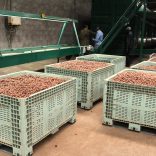Mozambique aims to shift from subsistence agriculture to income-generating farming
Mozambique: Government records sale of over 13 million tonnes of fortified food

Photo: AIM
The Mozambican National Fortification Programme, which is aimed at improving public health by combating nutritional deficiencies through the addition of essential nutrients to staple foodstuffs, has sold over 13 million tonnes of food fortified with essential micronutrients.
According to Custódia Paúnde, Secretary of State for Industry, who was speaking on Monday in Maputo, at the training workshop for members of Civil Society Organizations under the Pull Strategy initiative, the sale of 13 million tonnes of fortified foods (maize flour, wheat flour, sugar, cooking oil and iodized salt) was reached over the last six years.
“This result should motivate everyone to continue selflessly and to make individual and collective efforts to promote the production and consumption of fortified foods in order to reduce micronutrient deficiency rates and, consequently, malnutrition among the Mozambican population”, she said.
Paúnde explained that food fortification guarantees the recommended daily intake of micronutrients “and has been considered the most cost-effective and sustainable strategy for preventing the deficiency of various micronutrients in low-income countries.”
In order to reach these public health goals, there is a need to monitor production for a better understanding of the challenges related to the distribution of fortified foods.
“This monitoring is crucial and timely for us to generate essential information on the evidence of the performance of fortified foods”, she explains.
The monitoring, “also allows us to identify brands that comply with food fortification regulations, labelling of fortified products, Mozambican standards and to collect meaningful data that will help us make more informed decisions.”
Paúnde also called for collaboration between civil society organizations, private business and the community in general to share knowledge, information and resources in order to achieve significant results in the fight against micronutrient deficiency which leads to chronic malnutrition.
For her turn, Enzama Wilson, World Trade Programme representative in Mozambique, said that civil society organizations have a particular role to play in consumer education, awareness creation and advocacy.
The Pull Strategy is part of the monitoring action to verify fortified foods distributed and sold in supermarkets, markets, grocery stores and wholesale stores, in order to ensure that consumers obtain the benefits of fortification.












Leave a Reply
Be the First to Comment!
You must be logged in to post a comment.
You must be logged in to post a comment.